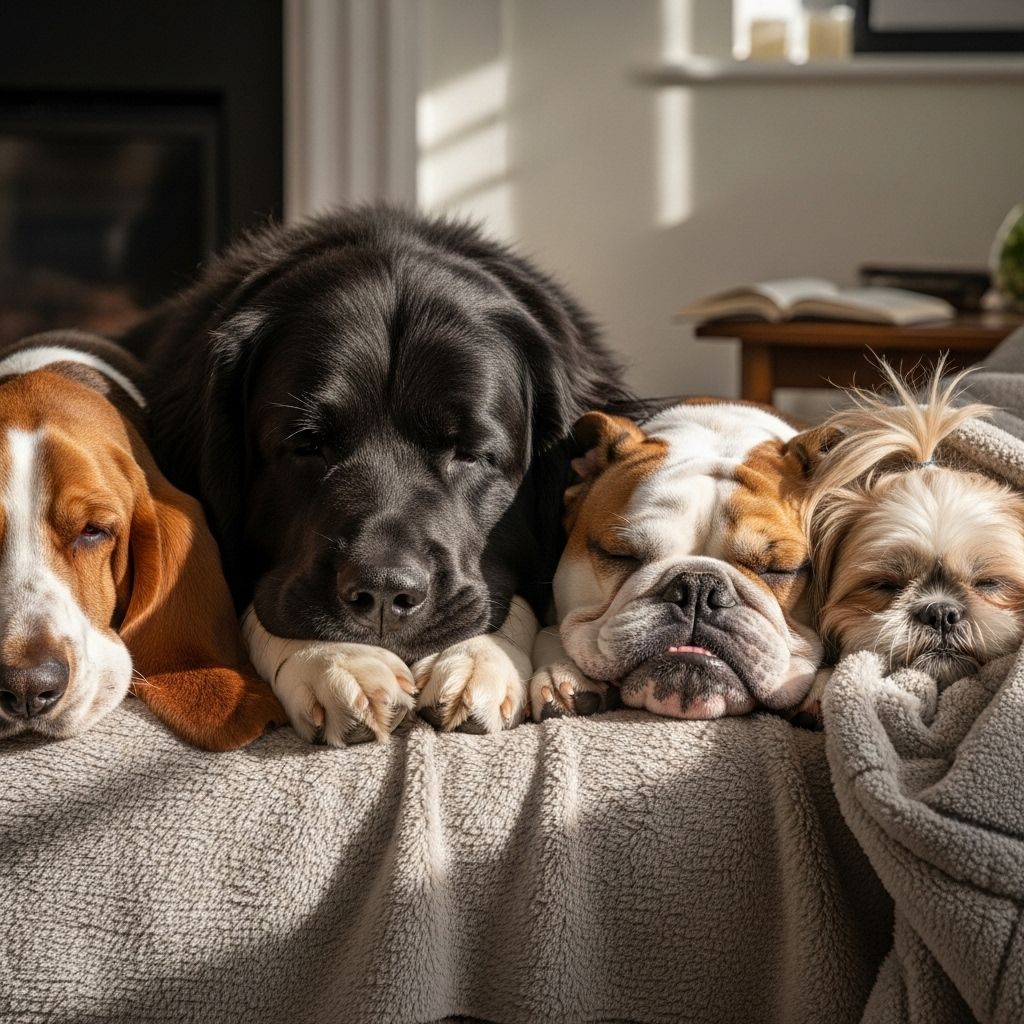Sleepy Dog Breeds That Need the Most Rest
Facial structure affects breathing, so longer quiet naps are vital for some pups’ comfort.

Introduction to Sleepy Dog Breeds
Getting enough sleep is essential for both humans and dogs. However, some dog breeds are more inclined to sleep than others. These breeds often benefit from extra rest due to their size, breed characteristics, or health conditions. Here, we explore the dog breeds that need the most sleep, including Basset Hounds, large dogs like Great Danes, and brachycephalic breeds such as Bulldogs and Pugs.
Why Do Some Breeds Need More Sleep?
While it might seem counterintuitive, active dogs often require less sleep than those with a more sedentary lifestyle. This is because active dogs expend their energy during physical activities, whereas less active breeds may not need to burn off as much energy throughout the day. Dr. Anna Foreman, an in-house vet at Everypaw Pet Insurance, explains that there are no specific breeds prone to sleep issues, but some are naturally more docile and sleep more than working breeds like Labradors and Cocker Spaniels.
Young Dogs and Sleep Needs
Young dogs, especially puppies, need more sleep than adults. This is because they expend a lot of energy playing and exploring their environment. As they grow older, their sleep needs decrease, similar to humans. However, certain breeds will always require more rest regardless of age.
Brachycephalic Breeds and Sleep
Brachycephalic breeds, characterized by their short, broad skulls, are prone to more sleep due to their facial structure. Dogs like Bulldogs and Pugs often have a shorter nose and similar amounts of soft tissue compared to other breeds. This can lead to breathing difficulties and snoring during sleep, as the soft tissues obstruct their airways. Overweight brachycephalic dogs may face additional challenges.
Common Sleepy Breeds
Some of the most common sleepy dog breeds include:
- Basset Hounds: Known for their laid-back nature, Basset Hounds are often happy to lounge around the house and take long naps.
- Great Danes: Despite their large size, Great Danes are surprisingly laid-back and love to sleep.
- Bulldogs: With their brachycephalic features, Bulldogs are prone to sleeping more due to potential breathing issues.
- Pugs: Like Bulldogs, Pugs are brachycephalic and often sleep more because of their facial structure.
Addressing Sleep-Related Issues
In some cases, sleep-related issues can be linked to health problems. Overweight dogs are more likely to experience sleep disturbances due to fat compressing their airways. For brachycephalic breeds, airway surgery might be necessary to alleviate breathing difficulties. Maintaining a healthy weight is crucial for these breeds.
Managing Your Dog’s Sleep
Here are some tips to ensure your dog gets enough sleep:
- Provide a Comfortable Environment: Ensure your dog has a quiet, comfortable place to rest.
- Manage Exercise: While exercise is important, excessive activity close to bedtime can interfere with sleep.
- Monitor Health: Regular check-ups can help identify any underlying health issues affecting sleep.
Frequently Asked Questions (FAQs)
Q: How much sleep do dogs need?
Dogs generally need between 12 to 18 hours of sleep per day, depending on their age and breed.
Q: What are brachycephalic breeds?
Brachycephalic breeds are dogs with short, broad skulls, like Bulldogs and Pugs. These breeds often experience breathing difficulties.
Q: Why do some breeds snore more?
Breeds with short noses and more soft tissue in their airways are prone to snoring due to airway obstruction.
Conclusion
Understanding which dog breeds are naturally more inclined to sleep can help you provide them with the care they need. By ensuring that your dog gets enough rest and maintaining a healthy lifestyle, you can help them live a happy and healthy life.
References
Read full bio of medha deb












